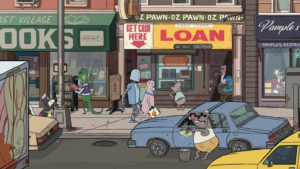Reviewed by GREG KING
Director: Terry Gilliam
Stars: Christoph Waltz, David Thewlis, Melanie Thierry, Lucas Hedges, Matt Damon, Tilda Swinton, Ben Wishaw, Rupert Friend, Peter Stormare.
Terry Gilliam is a former member of the Monty Python comedy troupe, but as a filmmaker he doesn’t seem to care much for commercial success or conventional stories. He is an audacious filmmaker with a vivid imagination and flamboyant visual style who packs more head-scratching wtf moments into his films than any other six pack of visionary directors combined. But he is also quite erratic, and his resume is littered with misfires, unfinished or abandoned projects, and as we saw in the documentary Lost In La Mancha his vision and ambition is often thwarted by the realities of filmmaking. And for every cult favourite like Brazil that he makes, there is also the unfathomable failures of films like The Imaginarium Of Doctor Parnassus (which became a mess following the tragic death of its star Heath Ledger) and the bewildering, baffling and downright bonkers films like 2005’s Tideland.
The final film in his unofficial dystopian trilogy that began with Brazil in 1985, and included Twelve Monkeys in 1995, The Zero Theorem is a weird tale set in a not too distant technology-obsessed future. This is another head-scratcher from Gilliam and it comfortably fits into his body of work. It offers a dark and disturbing vision of the not too distant future. And although it deals with themes of alienation, religion, love, free will, the corruption of technology and man’s relationship to technology, and the meaning of life itself, the film will probably not be easily accessible to those unfamiliar with Gilliam’s distinctive style. The first feature film written by Pat Rushin, The Zero Theorem seems tailor made for Gilliam and his unique brand of visual storytelling.
It stars a bald Christoph Waltz (from Inglorious Basterds, Django Unchained, etc) as Qohen Leth, a painfully introverted and downtrodden functionary and number cruncher who works for Mancom, a mysterious corporation. At the advice of his therapist, Leth constantly refers to himself in the royal “we”. He is obsessed with receiving an important phone call that will change his life and give it purpose, and he has been given permission by his oily and unctuous boss (David Thewlis) to occasionally work at home. Leth lives in an old abandoned church, and the loss of faith is another key theme in this offbeat tale.
After a meeting with management (in the form of Matt Damon) Leth is assigned the task of working on solving the zero theorem, an ongoing but pointless exercise that has got the better of other coworkers before him. It is a project that is supposed to unlock the secret of the universe and discover the secret of human existence. Management however sends a number of distractions his way in the form of Bob (Lucas Hedges), a teenage computer prodigy, and Bainsley (Melanie Thierry), a beautiful and seductive prostitute who introduces him to the world of virtual reality holidays.
The Zero Theorem seems more like a film of ideas drawn from a feverish imagination rather than a cohesive whole but it does pose some interesting and provocative questions. The film boasts some impressive and stunning production design from David Warren, which incorporates some elements of the steampunk design of the earlier Brazil. This is especially obvious in the look of the office where Leth works, crunching away at his tedious job. The street outside Leth’s home is a gaudy chaotic mess full of talking billboards and jarring neon advertising signs that make Tokyo and Times Square seem restrained. The bizarre elements of this not too distant future seem a little alien but somehow not too unfamiliar. But Gilliam’s vision also seems to have been hamstrung somewhat by a limited budget and the constraints of a tight shooting schedule.
Waltz took over the role of Leth from original choice Billy Bob Thornton, and he captures Leth’s sense of frustration, paranoia and loss of perspective with a rather manic performance that is removed from most of his other screen roles. A bleached blonde Damon is given little to do as the manipulative and enigmatic management, while a strange piece of casting sees an almost unrecognisable Tilda Swinton play a cyber-psychiatrist who only appears on Leth’s monitor screen. And there is a cast of crazy peripheral characters that add to the bizarre and abstract nature of it all.
★★☆




